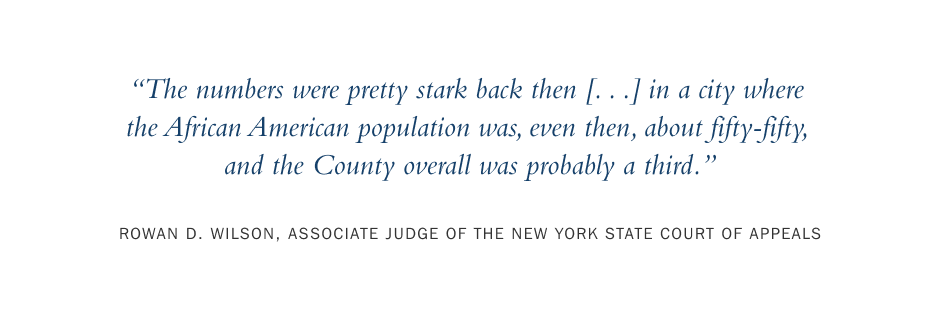Over the course of nearly forty years, Cravath has represented African American and female plaintiffs alleging employment discrimination by governmental employers in Birmingham, Alabama. Our work on the case started in 1983 led by the late Robert D. Joffe, a renowned trial lawyer and one of our former presiding partners. In 1992, then partner Rowan D. Wilson took over leadership of the case which he retained until 2017 when he retired and accepted an appointment from the Governor of New York to become an Associate Judge of the New York Court of Appeals. In December 2020, the case reached its conclusion under the leadership of partner Damaris Hernández—a reflection of the generations of Cravath attorneys who have supported this fight for justice.
On June 15, 2021, Cravath announced it will donate a total of $6 million to the Birmingham Civil Rights Institute, the Equal Justice Initiative, EJI’s Legacy Museum, Fisk University and the Lawyers’ Committee for Civil Rights Under Law. Funded from attorneys’ fees awarded to Cravath at the conclusion of this longstanding matter, please click here to read more about the donation.
THE BEGINNING
In 1974, private plaintiffs, the NAACP, and, a year later, the United States, filed claims alleging discrimination by numerous governmental employers in and around Birmingham, Alabama. After certain issues were tried, the defendants signed consent decrees designed to remedy past employment discrimination and ensure equal opportunity in the future. “The numbers were pretty stark back then,” said Judge Wilson, noting that of the 1,000 employees in the police and fire departments at the time, only one was African American and none were women. “This is in a city where the African American population was, even then, about fifty-fifty, and the County overall was probably a third”.1

In 1983, The Lawyers’ Committee for Civil Rights Under Law asked Cravath to represent the African American and female plaintiff class on a pro bono basis when the decrees were challenged as “reverse discrimination”. Joffe took the case, Martin v. Wilks, arguing on behalf of Black workers in Birmingham before the United States Supreme Court in 1989. The court ruled 5 to 4 that the reverse discrimination plaintiffs were not collaterally estopped by the consent decrees. That ruling, in part, led to the enactment of the Civil Rights Act of 1991, which negated some of the impact of the decision. Thereafter, Joffe and Wilson fought the reverse discrimination lawsuits and sought to enforce the other mandate of the decrees: the development of lawful job-selection procedures.
COUNTY INTRANSIGENCE AND PROGRESS
Despite Cravath’s persistent efforts to work with the parties to the decrees, the Personnel Board of Jefferson County failed to make progress in complying with the decree, and in 2002, Cravath prevailed in an evidentiary hearing where the district court found the Personnel Board in contempt of its obligations under the decree. The court appointed a Receiver to bring the Personnel Board into compliance and a monitor to report on its progress, and in 2008 that decree was terminated.
While the City of Birmingham made more progress in meeting its obligations to recruit, hire and promote African Americans and women, in 2008, the court-appointed monitor brought to the court’s attention new concerns regarding the City’s commitment to work effectively with the Personnel Board to resolve outstanding issues essential to lifting court supervision. After a lengthy and contentious period during which the court once again appointed a monitor and a special project manager to oversee the City’s progress, in 2011, the court concluded that the City had met its obligations under its decree and judicial supervision was no longer necessary and the decree was terminated.
In 2002, the Eleventh Circuit had remarked that the case was “older than the average college student,” but it could not have imagined that as of 2012, Jefferson County would still have made no good-faith effort and no progress toward meeting its obligations under its consent decree.
After filing a motion for contempt against Jefferson County for failing to comply with its consent decree, a two-week bench trial was held in the Northern District of Alabama in December 2012, during which Cravath attorneys presented the testimony of many men and women who had been discriminated against. In August 2013, the court held Jefferson County in contempt and appointed a Receiver to oversee all hiring and employment activities, and to be responsible for developing long-overdue selection procedures that would help assure future hiring and promotions be made without regard to race or sex. The various municipal defendants now employ women and African Americans in far greater numbers than they did 30 years ago, and the numbers steadily improved under the Court’s supervision.
Pleased with the County’s progress, in May 2018, the parties jointly submitted a proposed plan for the transition of authority from the Receiver back to Jefferson County. In June 2018, the court adopted the proposed plan, thereby terminating the Receivership and appointing a Monitor to serve until the County’s decree was terminated.
The Jefferson County Sheriff’s Office also made substantial progress and, as a result of its having demonstrated good-faith compliance with the decree and federal law, in March 2017, the Court approved a proposed Agreement from the parties, terminating the Consent Decree except for certain specified terms.
AN ASSOCIATES’ CASE
For nearly four decades, in addition to a significant partner commitment that included Joffe, Wilson, Hernández and Thomas G. Rafferty, numerous associates have had an opportunity to do meaningful work on the case. “The associates have written trial and appellate briefs, argued motions at monthly status conferences and hearings, and negotiated issues with counsel for the other parties. One associate deposed more than 50 County managers, and at the 2012 trial, the associates examined County managers, County commissioners and victims of the County’s discriminatory employment practices,” said Judge Wilson.
Now a partner at Cravath, Lauren M. Rosenberg worked on the case as an associate and remarked: “Working on this case was the most rewarding and exhilarating experience; as a junior associate, [it] allowed me the opportunity to work with experts, present the testimony of class members who were repeatedly passed over for positions and promotions they deserved and draft the proposed findings of fact and conclusions of law, chronicling 30 years of history.”
Helam Gebremariam, also now a Cravath partner, worked on the case when she was a summer associate in 2008, and recalled: “I spent a significant part of my summer in Birmingham interviewing potential class representatives about their experiences with racial discrimination while employed by the City. I remember feeling angered by the stories, inspired by the courage demonstrated in sharing them, and honored to have the opportunity to help seek justice.”
“Cravath has devoted an extraordinary amount of time and resources to this case for more than 30 years, and that commitment hasn’t wavered. Cravath’s willingness to see this case through is truly inspiring and I’m very proud to be part of a law firm that invests so much in pro bono litigation,” said associate Ali Z. Klein, who worked on the case most recently with Hernández.
A FAIRER FUTURE
While it has been a long road, the City of Birmingham’s police and fire departments now have equal numbers of White and African American police and firefighters, and the City has several high-ranking women and African Americans within its workforce.
Hernández took over leadership of the case in February 2017 when Judge Wilson was appointed to his position on the bench for the New York Court of Appeals. Forty-six years after the initial complaints were filed, she has helped usher the case to completion. In September 2020, the parties filed a joint motion asking the Court to lift the Consent Decree and terminate the case. On December 21, 2020, the Court granted that motion, subject to an 18-month sunset provision.
The joint motion marked the culmination of years of negotiation between Cravath and Jefferson County to ensure that the County will be able to operate as an employer without federal supervision. In the past few years, the County has onboarded a new HR director, created a hotline for employee concerns and created an Ethics and Compliance Office responsible for administering policies instituted as a result of the Consent Decree and monitoring the County’s compliance with state and federal law. “Cravath worked closely with the Receiver, the Monitor, the Special Master and the other attorneys to see this case through, and was committed to holding the County accountable until it reached the finish line,” said Hernández. “We are happy to say that our years of dedication and hard work paid off, and we hope that we have paved the way for a better future for the people of Jefferson County.”

The end of the litigation illustrates that Jefferson County has made tangible strides toward ensuring its government agencies and departments hire and promote without discrimination. Even so, the original class action plaintiffs who brought the case more than four decades before will not directly benefit, a reminder of the urgency of the fight against injustice. “We are proud of the progress demonstrated as a result of this case,” said Cravath partner Antony L. Ryan, who leads Cravath’s pro bono program. “This kind of work is important precisely because it is not easy, or fast, or seamlessly concluded. It requires dedication and persistence. That generations of Cravath lawyers have been able to help secure a measure of justice in Alabama is a tremendous point of pride for our Firm, and the next step is not to declare victory, but to look for the next fight in which we can make a meaningful difference.”
Over the many years that Cravath worked on this case, there have been contributions from numerous Cravath lawyers, many of whom have gone on to pursue careers in public service, business and academia.
1 Judge Wilson made this and the following statements while an active partner at Cravath.
Related Practices & Industries
People
-
J.D., 2007, New York University School of LawAnBryce Scholar
-
A.B., 2003, Harvard Collegemagna cum laude
- New York
Education
Admitted In
-
J.D., 2011, Columbia Law SchoolHarlan Fiske Stone Scholar
-
B.A., 2008, University of PennsylvaniaPhi Beta Kappa, summa cum laude
- New York
Education
Admitted In
-
J.D., 2010, New York University School of LawAnBryce Scholar
-
B.A., 2007, Columbia College
- New York
Education
Admitted In
-
J.D., 1995, Harvard Law Schoolmagna cum laude
-
B.A., 1992, Yale CollegePhi Beta Kappa, summa cum laude
- New York
Education
Admitted In
-
J.D., 1988, Harvard Law School
-
B.A., 1985, State University of New York, Old Westburysumma cum laude
Education
Cravath Bicentennial
Celebrating 200 years of partnership. In 2019, we celebrated our bicentennial. Our history mirrors that of our nation. Integral to our story is our culture.
Attorney Advertising. ©2025 Cravath, Swaine & Moore LLP.





